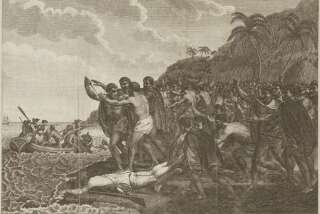Book review: ‘Unfamiliar Fishes’ by Sarah Vowell
Sarah Vowell is an intellectual melting pot. Her cleverness is gorgeously American: She collects facts and stores them like a nervous chipmunk, digesting them only for the sake of argument. Her curiosity is fueled by indignation. She insists, like a good empiricist, on seeing the people and places she writes about. She is the queen of that great American institution: the road trip. Pride, irritation and a kind of slightly sour laugh that is a common result of high irony are frequent responses to her work.
All of her books, and definitely this new one, can be summed up in the simple phrase: “Who the heck do we think we are?” “The Partly Cloudy Patriot” (how to be a good American, an interviewer at Salon wrote in 2002, “without being a terrible bore”), “Assassination Vacation” (in which Vowell takes the reader on a gruesome tour of the places where presidents Lincoln, Garfield and McKinley were shot), and “The Wordy Shipmates” (the story of the Massachusetts Bay Colony and how we have been haunted by the Puritans’ vision of themselves as God’s chosen people) chiseled a fault line through American exceptionalism. “Unfamiliar Fishes” is the quake.
Vowell’s story begins 100 years before the “orgy of imperialism” in 1898, when America annexed Hawaii and invaded Cuba, Puerto Rico, the Philippines and Guam. She has trained her eye not just on power but on “our favorite religion, capitalism, and our second-favorite religion, Christianity.” Following these threads takes her to the late 1700s and the exploration of Captain Cook and the first missionaries in the early 1800s.
“My ideal picture of citizenship,” Vowell wrote in “The Partly Cloudy Patriot,” “will always be an argument, not a sing-along.” It is in this spirit that she teases the hypocrisy from our earliest interactions with Hawaii, particularly its ruling class. Not that she is surprised by the utter disregard with which missionaries and politicians pursued their ends: “In America, on the ordinate plane of faith versus reason, the x axis of faith intersects with the y axis of reason at the zero point of ‘I don’t give a damn what you think.’”
Every so often, she veers off course to stick it to the British, “That’s how stuck up the British were,” she writes of the moment when the Hawaiian royalty ceded Oahu to the British, “whole archipelagoes were handed to them and they were too busy ruining continents to notice.” To the French, “All things must be examined, debated, investigated,” she quotes Diderot, “without exception and without regard for anyone’s feelings.” And of her own arrogance, she notes, “I had spent my high school years trying to hide just how pretentious I was.” This tone can be wearying; Vowell’s version of history feels pushed down one’s throat with more vehemence than was ever attached to the great myths that feed our superiority. This irritation commonly accompanies reminders of our checkered past in terms of equal rights for Native Americans, women, African Americans and Latinos, but some sentences are just too heavily laden with foreshadowing and irony.
Vowell is perhaps better read straight up — the scenes where she observes Hawaiians’ profound sorrow over the loss of their land and their heritage, or the parts in which she takes her 8-year-old nephew Owen to see not just the tourist landmarks but the places where loss occurred and blood was spilled. Clearly, she hopes that a new generation will see history like it was, not how we wish it was.
So what does she want from us? She wants us to drop our native credulity, no matter how endearing, how childlike it may be. She wants us to see that the annexation of Hawaii rests on shaky legal and moral grounds. Vowell ends on a scene in which she introduces Owen to the songs of Hawaiian crooner Israel Kamakawiwo’ole (Iz), famous for his version of “Over the Rainbow.” She plays him another song, “Hawaii ‘78,” in which Iz sings about the highways and condominiums that scar his native land. “What is this song about?” Owen asks. “It’s about how people like us wrecked this place,” Vowell tells him.
Salter Reynolds is a Los Angeles writer.
More to Read
Sign up for our Book Club newsletter
Get the latest news, events and more from the Los Angeles Times Book Club, and help us get L.A. reading and talking.
You may occasionally receive promotional content from the Los Angeles Times.






